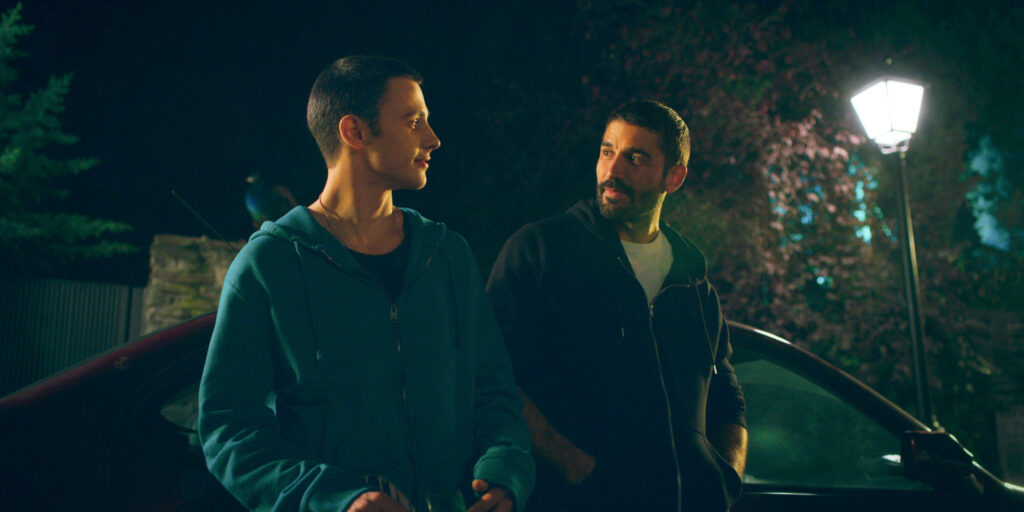Two series that recently dropped on Netflix, “The Bastard Son & The Devil Himself,” and “Holy Family” feature queer characters, identity issues, and, yes, family drama. Both are worth watching.
The diverting fantasy series, “The Bastard Son & The Devil Himself,” based on Sally Green’s novel, “Half Bad,” is full of magic dust, superpowers, and fabulous special effects as teenage Nathan (Jay Lycurgo) grapples with the fact that he is a Blood Witch. His sister, Jessica (Isobel Jesper Jones), is a Fairborn Witch, and they have a rivalry — in part because she blames him for their mother’s death.
When Nathan meets another witch, Annalise (Nadia Parkes), at school, they form a connection. However, Nathan is soon taken away for training by Ceelia (Karen Connell); he is preparing to fight his father, Marcus (David Gyasi), who has immense powers. But Annalise’s father, Soul (Paul Ready), head of the Fairborn Council, casts a spell on Nathan in an effort to control his destiny.
As Nathan and Annalise hit the road, they become embroiled in a complex power struggle between the warring factions of witches. Jessica who aligns with Soul, uses her ability to shapeshift and take on the form of other people, often for nefarious purposes. Meanwhile, Annalise discovers that she can decimate things with her mind. (The special effect of her exploding bodies is fantastic.) In contrast, Nathan is still awaiting his special powers, but he can hear heartbeats, and he has a map etched into his hand that leads him to the queer Gabriel (Emilien Vekemans), who will guide Nathan and Annalise to Mercury (Róisín Murphy) to get the blood Nathan needs to live.
“The Bastard Son & The Devil Himself” plays out like an extended chase as episodes depict Nathan, Annalise, and Gabriel meeting various people on their misadventures, only to have Jessica, Soul, and the rest of the Fairborn Council closing in on them. As the drama builds in a race against time, there is some romance — Nathan and Annalise fall in love, and Gabriel is smitten with Nathan — as well as various double crosses and reversals of fortune. There is also some non-gory heart eating. (It provides certain characters with power).
The attractive leads are all charismatic, especially as they are put in situations that require a bit of luck and cunning. Yet the inventive and impressive visual effects are the best part of the series, from the various colorful mists, to a spell that “connects” two rival characters, to portals through space, and scenes where characters are frozen or reanimated. Overall, the magical realism is dazzling.
The nifty series also includes messages about fitting into one’s own skin, enduring difficult times with good people, and finding a family — all themes queer viewers will appreciate. “The Bastard Son & The Devil Himself” sets up a second season, which means viewers will likely and luckily get to spend more time with these ingratiating characters.

Also on Netflix, “Holy Family” is out gay creator Manolo Caro’s, (“House of Flowers”) twisty melodrama about Gloria (Najwa Nimri) who is determined to protect her family — her baby, Hugo, and her college age twins Aitana and the closeted Abel — at any cost.
Gloria and her children are now living in Madrid, having fled a dark episode from their past. She is hoping to secure passports that will enable them to move to Canada. Until then, Gloria tries to fit in, befriending Blanca (Macarena Gómez), Alicia (Ella Kweku), and Caterina (Alba Flores). She even puts on a friendly demeanor as she lies about her children; Aitana is said to be the family’s au pair, while Abel is relegated to the basement, completely hidden from sight.
When Abel sneaks outdoors one night, he meets the much older Germán (Álex García) and they flirt, eventually becoming romantically involved. (The sexual tension between them is delicious.) However, Germán is Caterina’s husband, and when Blanca spies Germán and Abel kissing, she feels obligated to tell her friends.
It is quickly revealed that Caterina and Germán, are being paid to “investigate” Gloria’s family, because something shady is going on with them. As “Holy Family” unfolds, there are faked deaths, fake pregnancies, fake marriages, and fake identities. Many characters lead double lives and recalibrating the truth is part of the show’s fun. There is also a growing body count as well as some hot sex — as when Germán seduces Abel while Aitana hooks up with Marcos (Álvaro Rico), in a sequence that mirrors each sibling’s amorous encounter.
But mostly, “Holy Family” is about motherhood. Blanca has a special needs child, Alicia is looking to adopt a baby, and both Caterina and Gloria are caring for newborns. While “Holy Family” emphasizes that “There is nothing a mother would not do for her children,” the way the characters manipulate, lie, deceive, and betray each other prove this thesis repeatedly. The show is engaging as it remains ambiguous as to whether Germán is really in love with Abel, or is he playing him? Gloria is also quite a formidable character, and she dresses in stylish outfits.
While Gloria’s ceilings have cracks, reflecting that the facades are sometimes imperfect, one of the show’s motifs is the stained-glass windows Gloria creates. The disparate narrative strands in “Holy Family” do all come together like a mosaic with pieces locking into place to create a larger, transparent, mostly satisfying whole.
